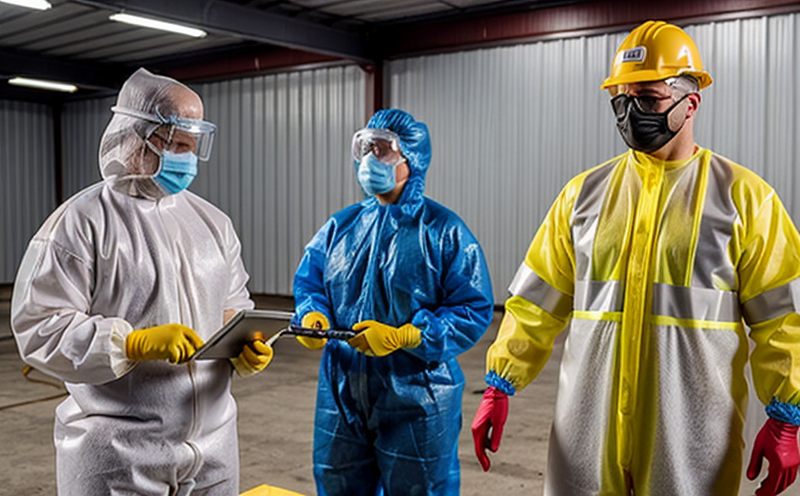ASTM F1862 Mask Synthetic Blood Penetration Resistance Testing
The ASTM F1862 Mask Synthetic Blood Penetration Resistance Test is a critical procedure used to evaluate the effectiveness of face masks in resisting penetration by synthetic blood. This test simulates real-world scenarios where masks are exposed to potentially infectious materials, ensuring that they meet stringent safety and performance standards set forth by international bodies such as ASTM International.
The ASTM F1862 standard is widely recognized for its role in validating the protective capabilities of face masks against penetration by blood-borne pathogens. The test involves subjecting a mask sample to synthetic blood under controlled conditions, monitoring the rate at which the blood penetrates through the material, and measuring the diameter of any holes or breaches that occur.
The primary objective of this testing is to ensure that face masks comply with regulatory requirements and provide adequate protection against potential exposure to infectious agents. By conducting such tests, manufacturers can demonstrate compliance with relevant standards and enhance consumer confidence in their products.
Here’s a step-by-step breakdown of how the ASTM F1862 test is performed:
- Sample Preparation: The face mask sample is cut into standard-sized pieces that are representative of the area intended for use.
- Synthetic Blood Application: Synthetic blood, which mimics human blood in terms of viscosity and other properties, is applied to one side of the mask sample.
- Testing Conditions: The sample is subjected to a specified pressure or force that simulates real-world conditions of use.
- Data Collection: The rate at which synthetic blood penetrates through the mask and the diameter of any breaches are recorded.
The test results provide valuable insights into the integrity and effectiveness of the mask material in preventing the transmission of infectious agents. Compliance with ASTM F1862 ensures that masks meet rigorous safety standards, thereby protecting users from potential health risks associated with exposure to blood-borne pathogens.
Understanding the importance of this test is crucial for quality managers, compliance officers, R&D engineers, and procurement teams who are responsible for ensuring product safety and efficacy. By staying informed about these testing protocols, stakeholders can make well-informed decisions that contribute to public health and safety.
Why It Matters
The ASTM F1862 Mask Synthetic Blood Penetration Resistance Test is essential for several reasons:
- Safety Assurance: Ensures that masks provide adequate protection against the transmission of blood-borne pathogens.
- Compliance with Regulations: Helps manufacturers comply with international standards and regulations.
- Consumer Confidence: Builds trust in products by demonstrating adherence to rigorous testing protocols.
- R&D Innovation: Provides valuable data for improving mask design and functionality.
The test plays a pivotal role in safeguarding public health, especially in healthcare settings where the risk of exposure to infectious agents is high. By ensuring that masks meet stringent safety standards, this testing process contributes significantly to minimizing the spread of diseases through proper respiratory protection.
Industry Applications
| Application Area | Description |
|---|---|
| Healthcare Facilities | Masks used in hospitals, clinics, and other healthcare settings are subjected to this test to ensure they can withstand the rigorous conditions faced by medical professionals. |
| Critical Infrastructure Workers | Masks worn by first responders and emergency workers are tested to guarantee their effectiveness in high-risk environments. |
| Manufacturers of Personal Protective Equipment | Testing is mandatory for manufacturers to ensure that their products comply with international standards and regulations. |
| Research Institutions | Masks used in laboratories are tested to prevent the accidental spread of pathogens during experiments. |
The ASTM F1862 test is a cornerstone for ensuring that face masks meet the necessary standards, thereby protecting users from potential health risks. Its applications span various industries where respiratory protection is paramount.
Customer Impact and Satisfaction
- Enhanced Safety: Customers receive products that are proven to resist penetration by synthetic blood, enhancing their safety in potentially hazardous environments.
- Regulatory Compliance: Products tested according to ASTM F1862 meet regulatory requirements, ensuring legal compliance and reducing the risk of product recalls.
- Increased Confidence: Customers gain confidence knowing that the products they use have been subjected to rigorous testing protocols.
- Improved Product Quality: Testing helps manufacturers identify areas for improvement, leading to better-performing products.
The ASTM F1862 Mask Synthetic Blood Penetration Resistance Test has a direct impact on customer satisfaction by delivering high-quality, reliable protective equipment. This testing ensures that the masks meet the necessary standards and provide the intended level of protection.





